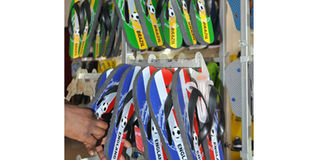Taking advantage of World Cup to grow sales

Sandals at a Bata outlet in downtown Kampala. Many businesses invested in World Cup related items to improve their sales. PHOTO BY ERONIE KAMUKAMA
What you need to know:
Taking advantage. A number of businesses have taken advantage of the World Cup to improve their sales.
The 2018 FIFA World Cup kicked off in Russia 28 days ago and will end this Sunday.
Hundreds have watched and many can’t bear that it is soon ending. The World Cup is one of the biggest sports events coming once at the end of every five years.
However, for businesspeople, it is a huge opportunity to earn and promote their brands. We are almost at the tail end of the showcase but signs are businesses won’t want to take any chances. They still want to make that last coin before it folds.
On Dastur Street as you slope into downtown Kampala, a goalpost net hugs a glass wall in a shoe shop. A collection of other outfits such as shoes and sandals in different colours fill a section of the shop that predominantly sells regular shoes and sandals.
Bata, which runs this shop as a franchise, has used the football season to grow its sales through producing branded sandals. Thus, for anything you buy above Shs100,000, you are given free sandals, according to Denis Kiire, the district sales manager Bata. The sandles are branded in the colours of different teams that have participated in the World Cup finals.
Boosting sales
Businesses, according to Kiire used promotional products during the World Cup to boost product lines and the strategy is paying off.
“Our target was 10 per cent. So far, we are at 7 per cent but we hope by the end of the campaign, we will have attained our target,” he says.
While Bata focused on that strategy, a bar just outside Kampala Town has used a different approach. As people make their way home on a cold Tuesday, loud cheers scruff through a bar in Kiwatule, Kampala.
Nigeria has just scored against Argentina and understandably, the excitement explains why. A rough estimate puts the people inside the bar at 140, which is rare for a Tuesday.
Most of them are sipping on a drink, with majority taking beer, whisky or a soda.
“It is a fair turn up. I usually have between 30 an 40 people,” an attendant who prefers anonymity, says.
The bar has a big screen in one corner and a music system in the other that are supplemented by other giant screens on days when the number is much larger.
On this particular night, a customer is given an extra beer for every two they buy.
However, not every fan has been watching from the bar. Some have been enjoying at their homes thanks to live shows from pay television.
Businesses that depend on such content including DStv, Gotv, Kwese Tv and StarTimes did strategic promotions that have been running throughout the season.
“It is a big driver for us,” says Tina Wamala, the MultiChoice public relations officer, adding: “We have seen an upward trend in sales and subscriber [numbers].”
Beyond this, betting companies have been in business given that around this time (when leagues close) business is slow.
Livingstone Mugambe, the Betpawa marketing manager, says the World Cup has saved a slow business period with the company seeing a “40 per cent [growth in bets] instead of the 20 per cent when major leagues”.
Betpawa, Mugambe says, spent about Shs200m on promotions and has seen a return on their investment.
With about Shs2,000 on average, between 15,000 and 20,000 bets were placed through Betpawa in the first week of the World Cup.
However, this number has dropped slightly but the company is counting to recoup much of the investment from new season.
“To be honest, there is a drop because so many big teams have gone back home. When customers experience such losses, it affects us in terms of bets,” he says.
Clive Kyazze is a marketing officer at Betway and as expected the World Cup has brought in a lot of activity for them.
However, he admits the surprise exits of big teams such as Germany has had an effect on the number of bets they had expected.
“The World Cup ushers us into the season of the European leagues so [it has kept] our clients busy and in the mood to bet with us when the leagues start,” he says.
LOW RETURNS
Counting losses. However, not all businesses have enjoyed the fruits of the World cup.
While the World Cup followed a slow business season due to the month of Ramadhan, a bar in Wandegeya had thought it would take advantage to recoup some sales.
“We planned to have a full house during the big matches [but it has been different,” the manager says.
The bar, which has a sitting capacity of about 100 people, has majorly hosted about 60 to 70 on average.
“There is hardly any business impact because of competition from small bars,” the manager says.
The fact is, he says, many outlets such as television stations and mobile phone applications have been broadcasting the showcase, which has left us counting losses.
On Ben Kiwanuka Street, one business has curved out a market as a sports centre with huge stocks of branded sportswear.
While teams such as Senegal, Nigeria made it to the World Cup, failure to make it to the final stages has left this sports shop with huge unsold merchandise.
“We bought many jerseys for the African teams but business went down because they dropped out fast,” the shop attendant says.
However, the attendant is optimistic that they will sell the merchandise in the course of the sports season or even during the 2022 World Cup.




